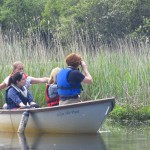In this GeoNet seminar we were joined by Gitte Kragh (BU Life Sciences), Hayley Roberts (BU AAFS), Rick Stafford (BU Life Sciences) and Paola Palma (BU AAFS), to discuss their different experiences with volunteers and the challenges they faced during the process. Outsourcing of data collection to volunteers is becoming increasingly popular, allowing the time consuming task to become much more efficient. It also provides a beneficial experience for the volunteers, making unique topics and discoveries accessible to the public. For example, Hayley Roberts expressed the importance of sharing archaeological finds, which would usually be off limits to the public, in order to enrich learning and understanding of Britain’s past.
Similarly, Paola Palma discussed her maritime archaeology projects, including the M.A.D. About The Wreck project, which encouraged the wider community to get involved and learn about maritime heritage in Poole. She has made projects accessible to the entire community, providing opportunities for disabled people and even prisoners to get involved and learn.
Gitte Kragh continued the discussion delving deeper into the sociological aspect of citizen science. She has investigated the relationship between volunteer happiness, work ethic and the outcomes for conservation. It seems that the happier the volunteers the greater the efficiency of work. However, the social aspect of volunteering, making friends and socialising with other volunteers may also inhibit work output. This therefore suggests that management of the projects is highly important and should be specialised depending on the age, skill level and type of project, in order to balance volunteer experience and success of the project.
Public participation plays a key role in data collection as Rick Stafford went on to discuss. Rick has explored the use of social media to help with citizen science such as the collection of bee biodiversity data. Using smartphones and apps is a useful and easy way to collect data on a large scale. Engaging the public is a great way to simultaneously collect data whilst educating and encouraging the community to become actively involved in the conservation of our environment and ecosystems. There are challenges however, as the precision and accuracy of the data collected may be limited due to volunteers’ skill level.
All agreed that management of volunteers was crucial to provide successful outcomes for both the volunteers and the project. The extent of engagement from volunteers is dependent on both social and environmental factors. Hayley Roberts agreed that there are many challenges to overcome, particularly in the Archaeology field, where legislation is usually there to restrict access out of fear that unskilled volunteers will cause destruction to these finite resources. Overall though, it seems that citizen science has a fundamental role in collecting important data, whilst providing an invaluable learning experience for volunteers allowing them to actively participate in environmental conservation, raising public awareness in the process.
Charlotte Unwin, GeoNet Intern
Our next seminar is this Thursday the 21st May from 1-2 in PG19. We have a visit from Craig Young (Reader in Human Geography at Manchester Met University), joined by Tim Darville (BU SciTech AAFS) and Anne Luce (BU M & C)
Craig is currently organising a seminar series which will include the politics of (re)burial, trade in body parts, dark tourism, body donation, diaspora and bodily disposal, the ethics of excavation, ‘green’ burial and theological perspectives on the dead body. In this seminar he will give us a perspective on corpse geographies and deathscapes (places for death, dying, mourning and remembrance). He will be joined by Tim Darvill (BU SciTech AAFS) who has recently published on life, death, ritual and regional identity in Britain c. 1600 BC and by Ann Luce (BU M & C) who will bring a perspective from her research into suicide rates across the US and UK, discourses on suicide and suicide in the media.
 BU research on Citizen Science featured on Countryfile
BU research on Citizen Science featured on Countryfile










 BU attendance at third annual GCPHR meeting in June
BU attendance at third annual GCPHR meeting in June Interactive Tangible and Intangible Heritage Applications – BU student work featured in new book chapter
Interactive Tangible and Intangible Heritage Applications – BU student work featured in new book chapter Second NIHR MIHERC meeting in Bournemouth this week
Second NIHR MIHERC meeting in Bournemouth this week MSCA Postdoctoral Fellowships 2025 Call
MSCA Postdoctoral Fellowships 2025 Call ERC Advanced Grant 2025 Webinar
ERC Advanced Grant 2025 Webinar Horizon Europe Work Programme 2025 Published
Horizon Europe Work Programme 2025 Published Horizon Europe 2025 Work Programme pre-Published
Horizon Europe 2025 Work Programme pre-Published Update on UKRO services
Update on UKRO services European research project exploring use of ‘virtual twins’ to better manage metabolic associated fatty liver disease
European research project exploring use of ‘virtual twins’ to better manage metabolic associated fatty liver disease